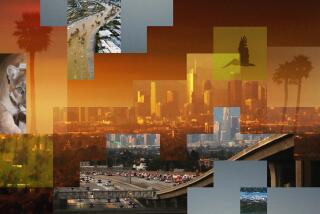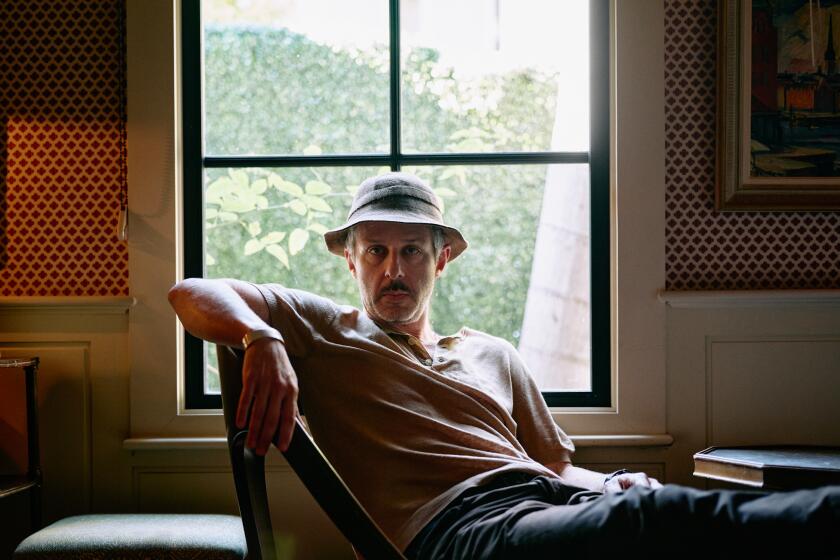Chinese Eye on L.A. : Visiting Camera Crew Shooting Documentary of City
Los Angeles, which was leveled by Mother Nature in “Earthquake,” bombed out by the U.S. Army in “War of the Worlds” (to destroy invaders, the Pentagon claimed) and devastated by rioting movie fans in “The Day of the Locust,” will soon star in a Chinese film.
However, the four-man Peking crew currently shooting here says that this will not be a disaster movie. Rather, the non-commercial, nonpolitical documentary will emphasize such wonders of Los Angeles as:
- Pedestrians who faithfully obey traffic signals, unlike those in Peking (or New York, for that matter).
- A climate that is “very pleasant and mild” (though the visitors decided not to film from the 27th-floor tower of City Hall because “we can’t see very far”).
- Freeways that are “impressively constructed and run smoothly” and seem to require no policemen to direct the traffic on them.
“The film will have a beautiful Chinese name that translates into something like, ‘Sights of Los Angeles,’ ” said the group’s translator, Paul Fang, a film producer with the U.S. Information Agency who has been lending a hand to the documentarians.
Indeed, the crew from the Central Newsreel and Documentary Film Studio sounds nearly as rhapsodic about Los Angeles as singer Randy (“I Love L.A.”) Newman. And they haven’t even had a chance to visit two tourist attractions praised in Newman’s ditty: Victory Boulevard and 6th Street.
“When we came here (in mid-December), people on the street say to us, ‘Merry Christmas’ and ‘Happy New Year,’ ” recalled cameraman Chen Kai-chu, the only member of the crew who speaks English. “People very nice.”
Though director Lei Zhen-lin recently shot a documentary on Rome, this is the first visit to the United States for the Chinese film makers. And the surprises have been many.
“There are so many automobiles,” soundman Wang Baoquan said. Like his colleagues, Wang has never piloted such machines, preferring bicycles instead.
Chen found the cab drivers here an odd sight. “In China,” he said, “taxi drivers are women, not men.”
While Los Angeles may be ahead in most areas of high technology, Chen noted: “In China, police do not ride horses.”
During a visit to Venice Beach (“They had heard of Venice back home,” translator Fang said), director Lei reported that the visitors were amazed to see many people dancing while wearing “dry skates” (roller-skates).
A bicycle that carried a rider on handlebars also caught their eyes.
“That, in China, would be something for acrobats only,” Lei said, adding that on a Peking city street such a maneuver would also draw a traffic ticket and a fine of as much as 20 cents.
The film makers, currently staying at a hotel in West Los Angeles, have about three weeks of work left.
So pleased are they that they hope that the 90-minute movie, which will be shown at schools and other non-commercial outlets in China, will be the first of a series on cities of the United States.
Other local sights that have intrigued them include:
- Universal Studios, where they smiled somewhat uneasily when Ron Moss, a stand-in for actor Mr. T, grabbed their $10,000 movie camera and pretended to film them.
- A Los Angeles City Council meeting, which started 45 minutes late when a quorum was finally mustered. (It was a Friday.)
- A UCLA class on the sociology of deviant behavior (the crew’s guides hadn’t known the exact nature of the class beforehand; the crew didn’t record any sound).
- A UCLA student, junior Alan Young, who has a part-time job in the campus student store. “They were fascinated because in China students don’t have jobs,” Fang said. “They (students) rely on their parents for money.”
- A religious zealot who preaches while balancing a cup on his head at the corner of 1st and Spring streets. Chen noted that Peking also has its sidewalk characters, “some religious, some wanting money,” but said he had never seen one who also did such a balancing act.
Inevitably, there have been a few negatives.
Fang said that Lei, a director of documentaries for more than 30 years, “was a little disappointed that the (Mann’s) Chinese Theater did not have footprints of Charlie Chaplin and Ingrid Bergman,” stars whose movies played in China in the pre-Communist days.
Then there was the encounter with hot dogs.
“They put cucumbers on mine,” Chen said with a frown. “Very sour.”
“I think he meant relish,” Fang said.
More to Read
Only good movies
Get the Indie Focus newsletter, Mark Olsen's weekly guide to the world of cinema.
You may occasionally receive promotional content from the Los Angeles Times.










